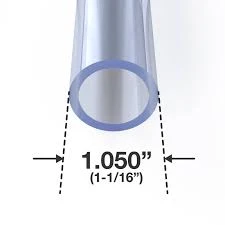Nov . 18, 2024 20:13 Back to list
Understanding the Advantages of PVC Sewer Pipe for Wastewater Management Solutions
Understanding PVC Sewer Pipes A Sustainable Choice for modern plumbing
Polyvinyl chloride (PVC) has become a prevalent material in construction, especially when it comes to plumbing applications such as sewer pipes. This popular choice is attributed to PVC's unique qualities, including its durability, resistance to degradation, and affordability. As communities increasingly seek sustainable solutions for infrastructure, PVC sewer pipes stand out for their environmental benefits and practical advantages.
PVC sewer pipes are renowned for their impressive longevity. Unlike traditional materials like clay or cast iron, PVC is highly resistant to corrosion and chemical damage. This quality ensures that the pipes maintain their integrity over time, reducing the need for frequent replacements and repairs. In fact, PVC sewer pipes can last up to 100 years when installed correctly, making them a cost-effective solution for cities and municipalities investing in long-term infrastructure.
Understanding PVC Sewer Pipes A Sustainable Choice for modern plumbing
The manufacturing process for PVC also offers environmental advantages. PVC is produced using less energy than other pipe materials, such as steel and concrete. Furthermore, PVC can be recycled, with a significant percentage of new PVC products being made from recycled materials. This commitment to sustainability aligns with global initiatives aimed at reducing waste and promoting eco-friendly practices in construction.
pvc sewer pipe

Moreover, PVC sewer pipes are designed to withstand various environmental conditions, including extreme temperatures and soil movements. Their smooth inner surfaces minimize friction, allowing for higher flow rates and reduced risk of blockages. This performance efficiency not only benefits the plumbing system but also decreases the likelihood of costly repairs and maintenance.
While some critics argue that PVC can release harmful chemicals during its lifecycle, advancements in manufacturing processes have greatly mitigated these concerns. Responsible production practices ensure that PVC sewer pipes are safe for use in municipal infrastructure, adhering to strict safety and environmental standards.
Incorporating PVC sewer pipes into modern plumbing systems also enables municipalities to better manage stormwater and wastewater. With increasing pressures on infrastructure due to population growth and urbanization, having reliable, efficient sewer systems is more critical than ever. PVC’s flexibility allows it to adapt to various landscapes, providing effective solutions for diverse geographical challenges.
In conclusion, PVC sewer pipes represent a forward-thinking choice for modern plumbing needs. Their durability, environmental benefits, and cost-effectiveness make them ideally suited for contemporary infrastructure projects. As cities and communities continue to prioritize sustainability, the adoption of PVC sewer pipes will likely increase, reinforcing their position as a vital component of 21st-century construction. With a focus on long-term reliability and environmental stewardship, PVC sewer pipes offer a pathway to more resilient urban infrastructure.
-
PVC Grey Sheet for Extraction: Chemical Resistant & Durable
NewsAug.19,2025
-
Durable PVC Pipe Fittings for Plumbing & Irrigation Needs
NewsAug.18,2025
-
HDPE Steel Belt Reinforced Spiral Corrugated Pipe | High Strength
NewsAug.17,2025
-
HDPE Pipe Fittings: Durable, Leak-Proof Solutions
NewsAug.16,2025
-
Premium CPVC Sheet: High-Temp & Chemical Resistant Solutions
NewsAug.15,2025
-
Durable PPR Pipe for Hot & Cold Water Systems - Easy Install
NewsAug.14,2025

